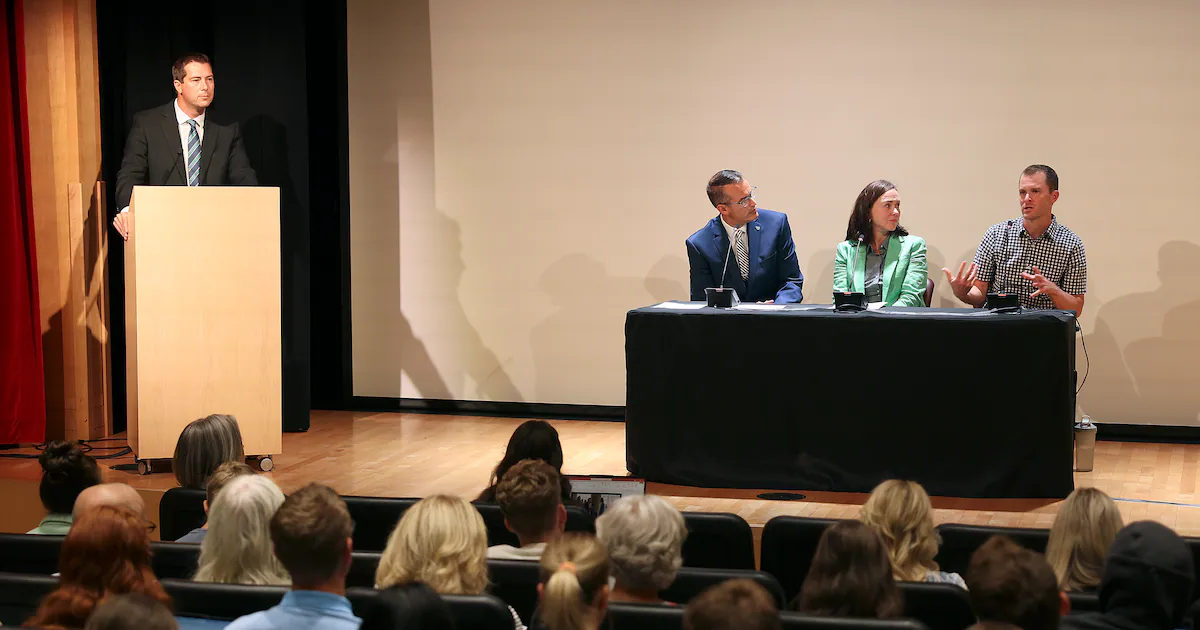
“When I was a teenager, I started reading the scriptures more, learning about the gospel, and I developed this really bright testimony and passion,” a student once told Adam Rogers, associate professor in the BYU School of Family Life.
Then she went to college, telling Rogers that she now sees so much tragedy and injustice in a world “in all its complexity, and there’s more questions than there are answers.”
She admitted, “I don’t know if I’ll ever get that same testimony back I once had. Is that just something I have to live with?”
Her professor responded, “That simplicity still exists within the context of a relationship with your Savior.”
Even though questions and complexity may continue, Rogers encourages students to not surrender the clarity that still comes from a “day to day walk with Jesus.”
“Experiencing Jesus Christ Through the Family Proclamation,” was the theme of a two-day, student-oriented conference concluding at BYU Friday. The conference commemorated the 30th anniversary of The Family: A Proclamation to the World of The Church of Jesus Christ of Latter-day Saints. The aim was to celebrate and elevate this seminal text “particularly for a rising generation of students who were not yet born when the proclamation was first released,” according to Jason Carroll, the Wheatley Institute’s Family Initiative director.
“For me, this conference helped me to refocus on the things that matter most,” said BYU student Molly Chadwick. “I felt like a lot of the dust cleared in my own heart and mind.”
“One option among many” is how more people see family, said student Emily Blackhurst. As an expecting mother, she said the conference helped her see motherhood not as a “transition of loss,” but rather as a “transition of joy that brings us closer to Jesus Christ.”
BYU student Mason Sowards said he feels like he has “always had a testimony of the proclamation, but this has just reaffirmed that God’s truth is eternal to me. And that’s been really empowering and set my vision for what I want my future family to look like.”
The final day of sessions were sponsored by BYU’s School of Family Life and the College of Religious Education, featuring talks and panel discussions from faculty in these two departments. Talks included “Mothers and Fathers, Complementarity and Equal Partnership,” by associate professor Jenet Erickson; “The Stewardship of Gender and Sexuality,” by assistant professor Ty Mansfield and an address by Barbara Morgan Gardner on equal partnership and the history behind the proclamation.
Science and religion in harmony
Larry Nelson, professor in the BYU School of Family Life, described initially struggling with the late Elder Neal A. Maxwell’s call to become a “disciple scholar” — unsure how to bring together social science and his convictions as a Christian.
As he began a serious study of how to teach The Family: A Proclamation to the World, Nelson describes experiencing for himself something President Russell M. Nelson had taught: “All truth is part of the gospel of Jesus Christ. Whether truth comes from a scientific laboratory or by revelation from the Lord, it is compatible…. There is no conflict between science and religion. Conflict only arises from an incomplete knowledge of either science or religion or both.”
President Nelson said he does not fear hard questions, including issues some insist reflect “insurmountable incompatibility requiring a choice of sides.” He feels reassured in that case that people are either misunderstanding the science or the doctrine or both.
Forgiving families
“It is incredible to hear from professionals who have dedicated their lives to the scientific research on divine truths that I value so much,” said Lorenzo Shakespeare, a Wheatley scholar and student in the School of Family Life.
Attendee Carl Cranney was struck by how a single word in the proclamation — forgiveness — was the focus of several presentations. “There is not a couple together very long that is not going to have to forgive,” said associate professor in the BYU School of Family Life, Chelom Leavitt. “If you want to create a lasting, meaningful, deep, intimate relationship, forgiveness is going to be at the core of it.”
Larry Nelson described struggling with harsh judgment after hearing stories of his grandfather’s treatment of his dad. But when he learned about how trauma can impact emotional development, he felt clear spiritual promptings that battle experiences in World War I had impacted how his grandfather later acted.
“The judgment of unempathetic and unkind feelings in my heart were instantly replaced with love and compassion,” Nelson said. “I had never made the connection between his experience in Europe and how he was,” Nelson said — an insight enabling him to “build a better relationship with my grandfather across the veil.”
Worshipping families
When his colleague Wes Burr asked how his family was doing, Loren Marks, professor in the BYU School of Family Life, told him about sharing his version of “I have a dream” with his kids recently.
“I have a dream that one night I will call you for scripture study and prayer, and you will come in. That’s it — all five of you. You will just come, no wheedling, no whining.”
Laughing on the phone, Burr said, “Loren, don’t forget that it’s not just about worshipping together. It may be even more important how you gather your family together.”
Marks cited colleague Heather Kelley as saying that “family worship is not meaningful every time. It is meaningful over time, when it becomes part of the spiritual DNA and fabric of a family.”
Adam Rogers described pushing against his parents’ invitations to worship earlier in his life. Yet when he started thinking more seriously about the gospel as a teenager, he said he realized his parents had modeled the practices that would help him get there. “The first thing I knew to do was to open the Book of Mormon, because that’s what I saw my parents consistently doing.”
Marks cited Wheatley Institute’s 11 nation, 16,000 person sample study that found three critical outcomes for families who engaged in home-centered worship: higher life meaning, better mental health and improved relational quality.
Likewise, a 2018 published article from his team that found “family prayer promoted unity, interaction, bonding, togetherness. It helped to raise, address and resolve issues and concerns and reduce tension.”
“Family prayer literally invites God into a home,” the article concludes. Brian Willoughby, professor in the BYU School of Family Life, added that there is “something very unifying about addressing divinity together, and can do that for couples too.”
Marks referred to President Nelson’s 2018 promise to families worshipping together that “your Sabbath days will truly be a delight. Your children will be excited to learn and to live the Savior’s teachings, and the influence of the adversary in your life and in your home will decrease.”
Making space for God
Dana Hunter, associate professor in the BYU School of Family Life, described research showing that many young adults who grew up saying a blessing on the food stop doing so when they move out and live on their own. After her own divorce, she experienced the same thing: “Without a family gathered around the table, I sometimes forgot to give thanks and say a blessing on the food.”
“I had to be intentional about inviting Christ’s presence into my daily life, pausing, offering a prayer of gratitude and remembering him, even when it’s just me at the table.”
Leavitt called prayer a “quiet time where I can be still” — representing “a beautiful form of mindfulness” and a “quietness we can learn in our own bodies.”
Our homes can become sacred sanctuaries, Hunter added, whether it is “full of children, shared with roommates, or occupied by just you and the Spirit of the Lord.”
One great family
Michael Goodman, BYU Religious Education professor added, “as long as we stay calm and connected and continue to love and live and grow, we need fear no unhappy ending.”
The Family Proclamation is not just for those who are married, he added. “It’s not limited to any group. It is a map to the eternal destiny of us all. If we seek to know how we fit into the plan, I testify that the Lord will show us.”
Natalie Hancock, associate professor in the BYU School of Family Life, described her own wait for marriage after growing up with parents married as high school sweethearts and grandparents with more than 50 years of marriage.
“Ministering has been one of the sweetest blessings in my life. I have felt its strength, both in giving and in receiving,” she said, speaking gratefully about her ward family, along with cousins, nieces, nephews and thousands of students she’s been able to teach.
When one student expressed appreciation for her influence, Hancock said that “confirmed to me that God uses us, even outside of traditional parenting, to nurture his children.”
In heavier days, she described “remembering that I am known individually by my Heavenly Father and Savior, Jesus Christ.… They know my potential. They know my worth. Our divine destiny is not dependent on circumstances, but on God’s eternal visions of who we are,” Hancock said.
She said family — both immediate and extended, both traditional and adapted — has been one of the greatest sources of strength, growth and purpose in her life.
The truths of the proclamation are “not limited by circumstance,” she added.
“They apply to every one of us, wherever we are on life’s journey,” Hancock concluded.
God’s plan is a “plan of belonging,” she said. “It is a plan of becoming. And as we live faithful to our covenants, we can trust him to shape our lives in ways far greater than we ever could have imagined.”



